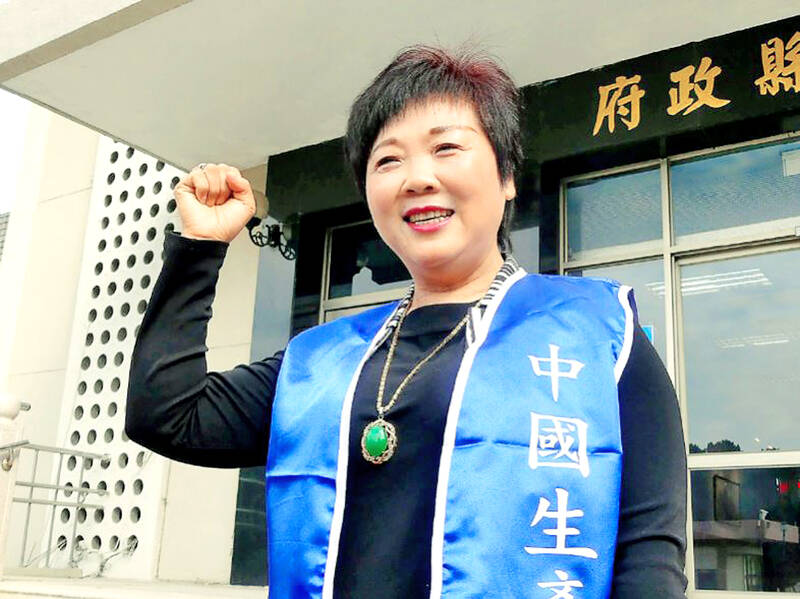Former China Production Party honorary chairperson Lu Yuexiang (盧月香) has reportedly accepted an official position in China and may be fined between NT$100,000 and NT$500,000 for contravening the Act Governing Relations Between the People of the Taiwan Area and the Mainland Area (臺灣地區與大陸地區人民關係條例).
Taiwanese are prohibited from holding any position or becoming members of any Chinese agencies, institutions or organizations that have political, military or administrative links to the Chinese government, Article 33 of the act says.
Lu, who is a native of China and holds Republic of China citizenship through marriage to a Taiwanese, is said to have taken up a position as a committee member of the Chinese People’s Political Consultative Conference (CPPCC) of Fujian Province.

Photo: Taipei Times
The Mainland Affairs Council said that it would ask local authorities to investigate the case, while the Ministry of the Interior said that it was in the process of understanding the issue and would mete out appropriate punishment according to the law.
The council urged Taiwanese to abide by the act and other regulations when engaging in cross-strait exchanges.
Lu came to Taiwan in 1992 after marrying a Taiwanese and became an ROC citizen in 2001, an official said.
She founded the Chinese Production Party in Taiwan in 2010.
However, its establishment was revoked as she had not had a household registration in Taiwan for at least 10 years, the official said.
Her husband later founded the China Production Party and she was named the honorary chairperson, the official said.
Lu would not be the first to be fined by the Taiwanese government for assuming an official post in China.
The Ministry of the Interior in March 2019 fined Ling Yu-shih (凌友詩), an ROC citizen, NT$500,000 for accepting an official position in China.
The ministry said at the time that Ling accepted a seat at the CPPCC as a representative of the China-Taiwan Association, a private organization established to “serve as a bridge and link between the ruling [Chinese Communist] party and government, and Taiwanese compatriots.”
Ling last month was quoted by Hong Kong’s Sing Tao Daily as saying that she was fined again by the ministry this year for accepting a position as a representative in China’s National People’s Congress.
She said she has not paid the two fines and would not pay them as doing so would be tantamount “to recognizing the Taiwanese authority and admitting fault” for taking up official posts in China.

Seventy percent of middle and elementary schools now conduct English classes entirely in English, the Ministry of Education said, as it encourages schools nationwide to adopt this practice Minister of Education (MOE) Cheng Ying-yao (鄭英耀) is scheduled to present a report on the government’s bilingual education policy to the Legislative Yuan’s Education and Culture Committee today. The report would outline strategies aimed at expanding access to education, reducing regional disparities and improving talent cultivation. Implementation of bilingual education policies has varied across local governments, occasionally drawing public criticism. For example, some schools have required teachers of non-English subjects to pass English proficiency

‘FORM OF PROTEST’: The German Institute Taipei said it was ‘shocked’ to see Nazi symbolism used in connection with political aims as it condemned the incident Sung Chien-liang (宋建樑), who led efforts to recall Democratic Progressive Party (DPP) Legislator Lee Kun-cheng (李坤城), was released on bail of NT$80,000 yesterday amid an outcry over a Nazi armband he wore to questioning the night before. Sung arrived at the New Taipei City District Prosecutors’ Office for questioning in a recall petition forgery case on Tuesday night wearing a red armband bearing a swastika, carrying a copy of Adolf Hitler’s Mein Kampf and giving a Nazi salute. Sung left the building at 1:15am without the armband and apparently covering the book with a coat. This is a serious international scandal and Chinese

TRADE: The premier pledged safeguards on ‘Made in Taiwan’ labeling, anti-dumping measures and stricter export controls to strengthen its position in trade talks Products labeled “made in Taiwan” must be genuinely made in Taiwan, Premier Cho Jung-tai (卓榮泰) said yesterday, vowing to enforce strict safeguards against “origin laundering” and initiate anti-dumping investigations to prevent China dumping its products in Taiwan. Cho made the remarks in a discussion session with representatives from industries in Kaohsiung. In response to the US government’s recent announcement of “reciprocal” tariffs on its trading partners, President William Lai (賴清德) and Cho last week began a series of consultations with industry leaders nationwide to gather feedback and address concerns. Taiwanese and US officials held a videoconference on Friday evening to discuss the

PERSONAL DATA: The implicated KMT members allegedly compiled their petitions by copying names from party lists without the consent of the people concerned Judicial authorities searched six locations yesterday and questioned six people, including one elderly Chinese Nationalist Party (KMT) member and five KMT Youth League associates, about alleged signature forgery and fraud relating to their recall efforts against two Democratic Progressive Party (DPP) legislators. After launching a probe into alleged signature forgery and related fraud in the KMT’s recall effort, prosecutors received a number of complaints, including about one petition that had 1,748 signatures of voters whose family members said they had already passed away, and also voters who said they did not approve the use of their name, Taipei Deputy Chief Prosecutor